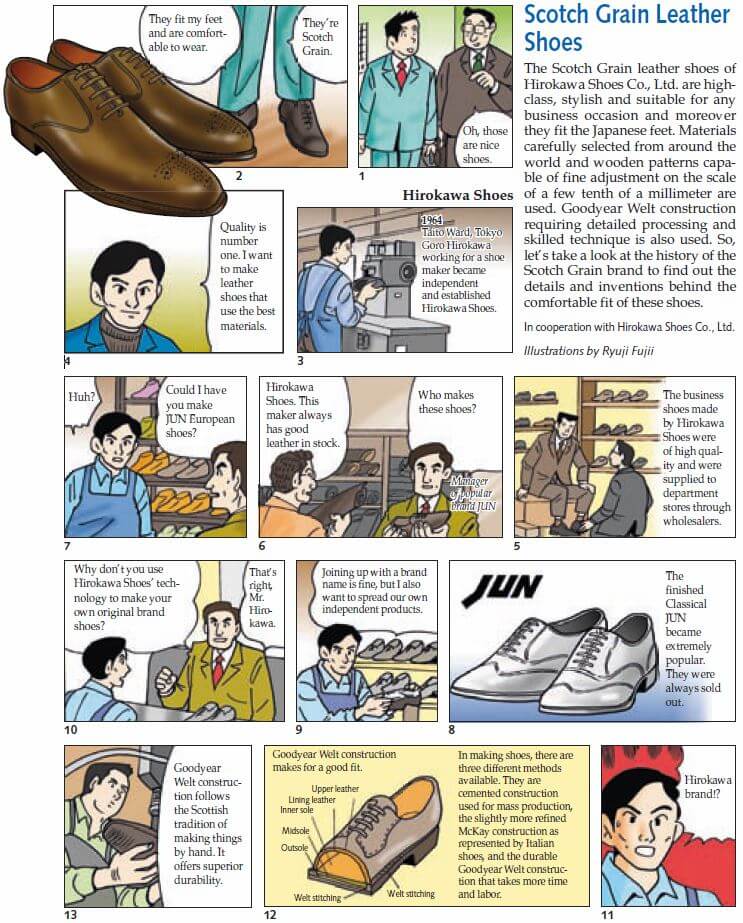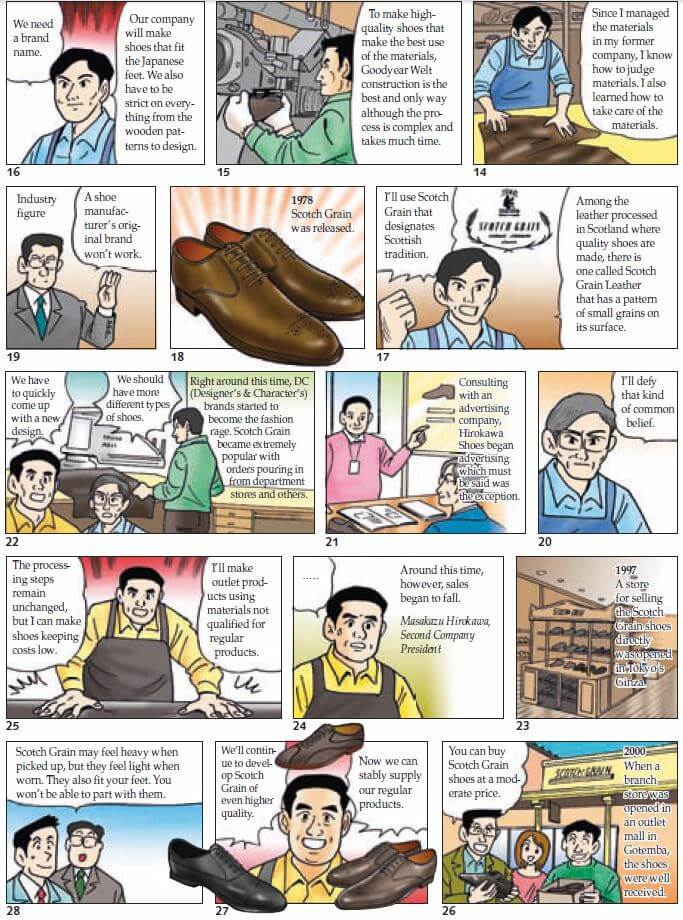Scotch Grain Leather Shoes and Its History
Scotch Grain Leather Shoes
The Scotch Grain leather shoes of Hirokawa Shoes Co., Ltd. are high-class, stylish and suitable for any business occasion and moreover they fit the Japanese feet. Materials carefully selected from around the world and wooden patterns capable of fine adjustment on the scale of a few tenth of a millimeter are used. Goodyear Welt construction requiring detailed processing and skilled technique is also used. So, let’s take a look at the history of the Scotch Grain brand to find out the details and inventions behind the comfortable fit of these shoes.


1. Oh, those are nice shoes.
2. They’re Scotch Grain.
They fit my feet and are comfortable to wear.
3. Hirokawa Shoes
1964
Taito Ward, Tokyo
Goro Hirokawa working for a shoe maker became independent and established Hirokawa Shoes.
4. Quality is number one. I want to make leather shoes that use the best materials.
5. The business shoes made by Hirokawa Shoes were of high quality and were supplied to department stores through wholesalers.
6. Who makes these shoes?
Manager of popular brand JUN
Hirokawa Shoes. This maker always has good leather in stock.
7. Could I have you make JUN European shoes?
Huh?
8. The finished Classical JUN became extremely popular. They were always sold out.
9. Joining up with a brand name is fine, but I also want to spread our own independent products.
10. That’s right, Mr. Hirokawa.
Why don’t you use Hirokawa Shoes’ technology to make your own original brand shoes?
11. Hirokawa brand!?
12. In making shoes, there are three different methods available. They are cemented construction used for mass production, the slightly more refined McKay construction as represented by Italian shoes, and the durable Goodyear Welt construction that takes more time and labor.
Goodyear Welt construction makes for a good fit.
Upper leather
Lining leather
Inner sole
Midsole
Outsole
Welt stitching
Channel stitching
13. Goodyear Welt construction follows the Scottish tradition of making things by hand. It offers superior durability.
14. Scotch Grain
Since I managed the materials in my former company, I know how to judge materials. I also learned how to take care of the materials.
15. To make high-quality shoes that make the best use of the materials, Goodyear Welt construction is the best and only way although the process is complex and takes much time.
16. Our company will make shoes that fit the Japanese feet. We also have to be strict on everything from the wooden patterns to design.
We need a brand name.
17. Among the leather processed in Scotland where quality shoes are made, there is one called Scotch Grain Leather that has a pattern of small grains on its surface.
I’ll use Scotch Grain that designates Scottish tradition.
18. 1978
Scotch Grain was released.
19. A shoe manufacturer’s original brand won’t work.
Industry figure
20. I’ll defy that kind of common belief.
21. Consulting with an advertising company, Hirokawa Shoes began advertising which must be said was the exception.
22. Right around this time, DC (Designer’s & Character’s) brands started to become the fashion rage. Scotch Grain became extremely popular with orders pouring in from department stores and others.
We should have more different types of shoes.
We have to quickly come up with a new design.
23. 1997
A store for selling the Scotch Grain shoes directly was opened in Tokyo’s Ginza.
24. Around this time, however, sales began to fall.
Masakazu Hirokawa, Second Company President
25. I’ll make outlet products using materials not qualified for regular products.
The processing steps remain unchanged, but I can make shoes keeping costs low.
26. 2000
When a branch store was opened in an outlet mall in Gotemba, the shoes were well received.
You can buy Scotch Grain shoes at a moderate price.
27. Now we can stably supply our regular products.
We’ll continue to develop Scotch Grain of even higher quality.
28. Scotch Grain may feel heavy when picked up, but they feel light when worn. They also fit your feet. You won’t be able to part with them.
- Categories
- Work in Japan: Japan Biz Cultural Words and 未分類


